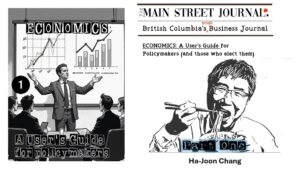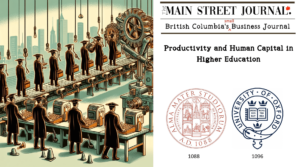Higher Education Lobbyists Line Up for Handouts
In September 2019, Oxford University in the UK published an article by Gwilym Croucher linking productivity and higher education:
“Universities and colleges now demand a greater proportion of public and private resources and form a larger part of the economic life of most countries. Higher education contributes to growth and economic efficacy and, hence, the overall productivity of an economy. While few scholars dispute the productivity-augmenting power of education…”[1].
[1] Productivity and Higher Education – Education – Oxford Bibliographies
…certainly, Canada’s Munir Sheikh doesn’t dispute the productivity-augmenting power of education. In January 2022, Canada’s Globe and Mail published this article by Professor Sheikh – who teaches public policy at Carleton University. Professor Sheikh is the former chief statistician of Canada, deputy minister of labor, and associate deputy minister of finance.
We must establish Canadian university education as a prestigious brand worldwide
“Canada is unique in the world, having directed itself toward a values system based on the philosophy that people of all races, religions and cultures can actually live together harmoniously and prosperously. Let us expand the size of this beautiful project and strengthen it by linking immigration with university education.
The prestige of a Canadian university education should become that international brand; it would allow us to punch well above our weight. For this to happen, we need public policies that work toward placing at least a few of our universities among the top 10 schools in the world. We currently don’t have any within this elite group, which is generally deemed to include the likes of Harvard, Oxford and Cambridge.
If we do establish a Canadian university brand and streamline our immigration system to fund and fast-track the best and the brightest students from all over the globe, we would have the best of all worlds: an acceleration in our living standards, more productivity and citizens with a greater understanding of their civic responsibilities.”
But Dr. Croucher’s 2019 comment about ‘few scholars disputing the productivity-augmenting power of education’ seems a little dismissive considering the increasing number of scholars who do, in fact, dispute the productivity-augmenting power of education.
It may not be surprising given that Dr. Croucher has been described as ‘having expertise in higher education and research policy drawing on his research focus on the funding and financing of universities, particularly those in Australia”[1].
[1] UC BERKELY – Goldman School of Public Policy
But one wonders how Canada’s former chief statistician makes that link when statistics don’t seem to point to any causal link between higher education and productivity.
According to a report released by Statistics Canada on November 30 of 2022:
“Canada continues to rank first in the G7 for the share of working-age people (aged 25 to 64) with a college or university credential (57.5%). A key factor in this is Canada’s strong college sector: nearly one in four working-age people (24.6%) had a college certificate or diploma or similar credential in 2021, more than in any other G7 country.”
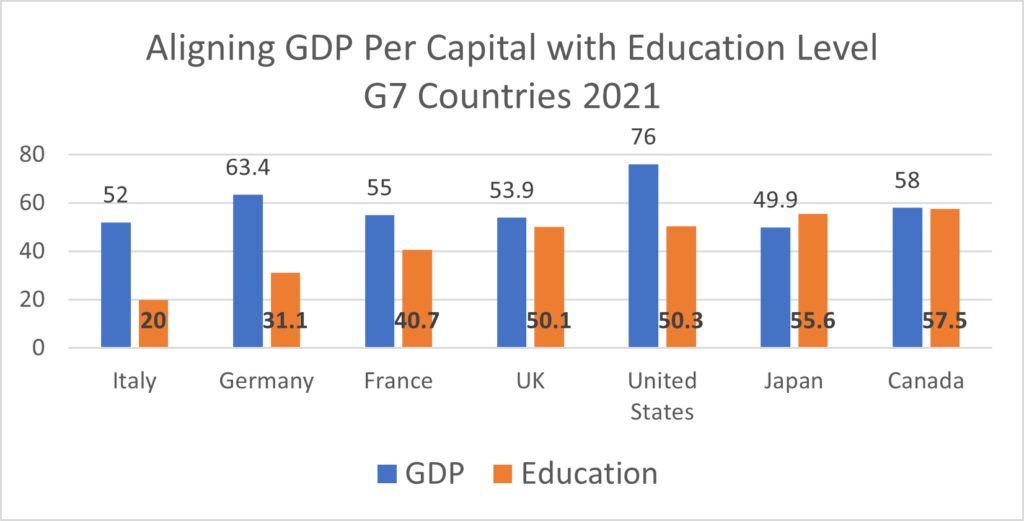
When we attempt to align productivity with higher education levels, there is no clear pattern of alignment. Canada has higher education levels than any other G7 country, but Germany and the US have much higher GDP per capita than Canada. Italy – with only about one third the higher education level of Canada, is no slouch when it comes to productivity.
So, what happens when we go to Oxford’s Our World in Data and look at the countries with the highest productivity levels?
Ireland and Norway lead everyone else in terms of GDP per capita. In Ireland’s case, this is because Microsoft has its head office there for tax reasons. Their massive lead in terms of productivity derives from ‘artifacts’ in terms of the way GDP gets attributed to countries with head offices of massive global corporations.
In Norway’s case, they get a huge bump because of the importance of North Sea oil to their economy. Canada has lower productivity than any of these countries, despite higher levels of educational attainment than any of them.
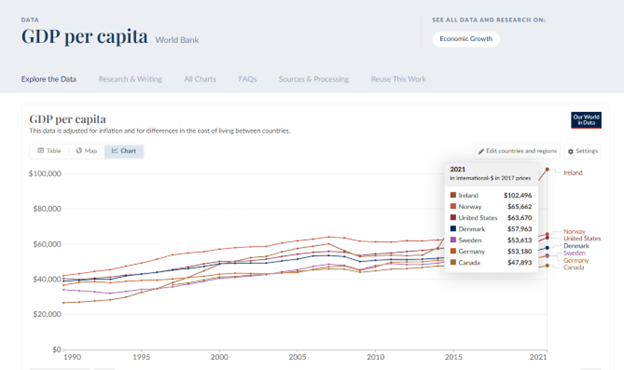
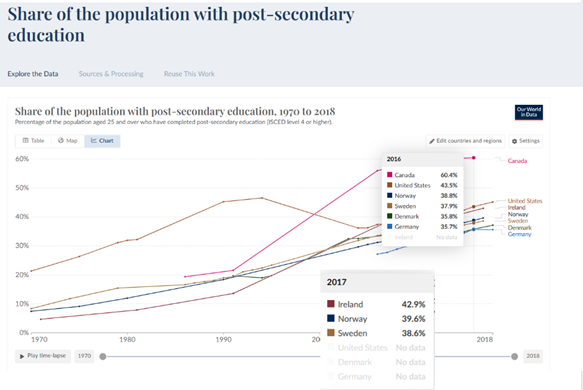
Croucher and Sheik behave like salesmen for their respective countries’ college ‘sectors’. Like all industrial sectors, higher education lobbies governments for handouts and enabling policies. The fact that we refer to a college ‘sector’ suggests higher education should be considered an industrial sector with its own grow-at-all-costs imperative.
If our policymakers want to increase Canada’s productivity, we need to encourage more investment in capital-intensive industries. Pumping out more MBAs and CPAs will improve the bottom lines of Canada’s higher education sector. But it won’t have any effect on our productivity. Instead – as the Harvard Business School study found – it does lead to degree inflation.
Degree inflation leads to higher employee turnover
“The survey showed that college graduates have higher expectations in terms of salary and quality of work life, when compared with non-degree workers in the same role. In terms of salary expectations, 59% of employers believed that recent college graduates expect higher salaries when compared with non-college graduates. They also perceived that college graduates have a far higher rate of voluntary turnover than non-graduates and a dramatically higher propensity to leave to work for a competitor (49%) than non-degree workers (12%).”
Employee dissatisfaction is the natural outcome of high levels of student debt, a competitive work environment where there is little to distinguish between themselves and other equally highly-educated (and ambitious) colleagues, all earning much lower salaries than they were told to expect.







